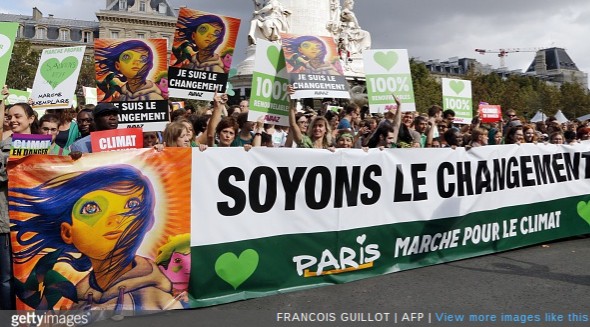How will history remember the Paris of 2015?
Certainly, it will recall the barbaric reign of terror during the evening of November 13. But may Paris also be remembered as the city where world leaders agreed on a deal to preserve the welfare of humanity’s common home?
Between 30 November and 11 December, government leaders from over 190 nations will gather in Paris to thrash out a new global agreement on climate change. The meeting is the 21st session of those signatories to the UN Framework Convention on Climate Change negotiated back in 1992, hence the official name of the 2015 Paris climate talks: the Conference of Parties (“COP”) 21.
The Catholic Church has played a remarkably prominent role in highlighting the crucial nature of the Paris negotiations. Ahead of the landmark summit, Pope Francis said, “It would be sad, and I dare say even catastrophic, were particular interests to prevail over the common good.” This followed a very clear application of Laudato Si teaching into concrete policy by the heads of episcopal conferences last month. In their 10-point statement, the patriarchs, cardinals and bishops called on global leaders to adopt a “transformational and legally binding global agreement” on climate change and “to set a goal for complete decarbonisation by mid-century”.
The timing and content of Laudato Si has not only provided a boost for climate campaigners, but it has also changed the terms of the wider debate about sustainability. Last week I brimmed with pride as I listened to a debate in the UK Parliament which was introduced by a motion noting that “the Pope’s Encyclical, entitled Laudato Si, Our Common Home, on climate change and international justice … is an important contribution to discussions on this vital subject…” The motion was passed after politicians of all shades and opinions waxed lyrical about the way the encyclical had injected the climate debate with a much needed ethical dimension.
It’s easy to slip into the idea that the keys are now held by global elites and that we can do virtually nothing to influence the outcome of the climate talks. But as the Pope has reminded us, humanity’s future doesn’t rest solely with government leaders. Rather it “is fundamentally in the hands of peoples and in their ability to organize.” So, brush up on what’s at stake in the summit (see the mini-guide below if that helps) and talk and pray about it. The Global Catholic Climate Movement have been doing wonderful work in the run up to Paris. Here are a couple of suggestions they make for action during the next couple of days:
- Sign their petition. Over 800,000 have already added their names. The Movement will be joining other faith groups in Paris to deliver petitions to the UN and French officials.
- Exercise your ‘ecological citizenship’ and join a climate march on November 29th near you!
Mini-Guide to the Paris Climate Talks
Why the meeting now?
The short answer to this is because existing global climate commitments negotiated at previous conferences expire in 2020. Paris will deal with the period beyond that.
A fuller answer is because global temperatures keep rising. Whilst the rate of increase has declined since a spike in 1998, the rate of warming appears to have speeded up again in the past couple of years. On current trajectories, scientists predict that the earth is heading for a rise of about 5C above pre-industrial levels. 5C doesn’t sound a lot, but remember the temperature difference between today and the last ice age was roughly 5C! It’s reckoned that a temperature rise of 2C represents an upper limit, if climate calamity is to be averted.
What climate commitments are already in place?
Much of the leg work has already been done in advance of the talks. Countries responsible for a combined total of more than 90% of worldwide emissions have proposed their own individual targets. For example, the EU undertakes to cut its emissions by 40%, compared with 1990 levels, by 2025. The U.S. will aim to cut emissions by 26%-28% compared with 2005 levels by 2030. China, on the other hand, has said that its emissions will peak by 2030.
So what are going to be the ‘hot button’ issues at Paris?
UN-backed analysis shows that even in the event that current emission reduction targets are honored, there would still be global warming of approximately 2.7C. Thus, one of the outcomes hoped for from Paris is agreement on a system of periodic reviews of emission cuts. Crucially, such an agreement would be legally-binding, something the negotiators spectacularly failed to achieve at the last major climate talks at Copenhagen in 2009.
Another key issue is that of funding. Billions of dollars were promised at Copenhagen for developing countries to adapt to low-carbon technologies. Paris will reveal the strength of these commitments.


